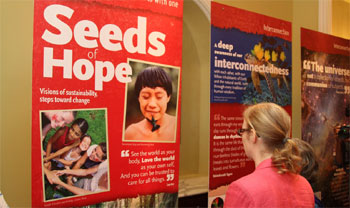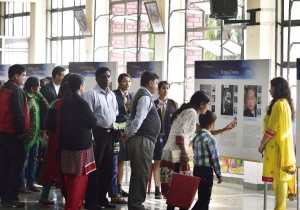
BSG was invited by Global Reporting Initiative (GRI) to participate in the conference organized by them at The Taj Mahal Palace, Mumbai, on 12 June 2014 and put up the exhibition Seeds of Hope: Visions of sustainability, steps toward change as part of the event. GRI felt Seeds of Hope would be a source of encouragement to the 180 delegates from India, Thailand, Sri Lanka, Bangladesh and Bhutan who would attend the conference.
The Seeds of Hope exhibition, a joint initiative of Soka Gakkai International (SGI) and Earth Charter International, introduces a vision for sustainable living expressed in the Earth Charter, and gives eight examples of individuals and groups, from different countries, who have taken action for change.
The delegates-thought leaders from business, civil society, government and social services-discussed the relevance and implementation of sustainability reporting, particularly in light of the Sustainable Development Goals (SDGs) proposed by the UN.
The award-winning SGI documentary A Quiet Revolution, featuring individuals who have worked to solve local environmental problems, was screened for GRI delegates on 11 June, the first day of their two-day Regional South Asia Conference in Mumbai. Seeds of Hope, sponsored by GRI, was shown on the second day as part of the programme that offered a platform for sharing and discussing strategies for systematic sustainability reporting in order to fulfil SDGs.
Makiguchi on the three levels of citizenship
During the first session of the second day, a short film made by BSG was screened, introducing BSG and SGI to the GRI delegates, showing them what the Soka organisations are doing in the field of sustainable development.
Following the film, BSG director Vinay Jain spoke about Soka philosophy and the Buddhist concept of dependent origination. He said:
At the centre of all of SGI and BSG’s endeavours is the core Buddhist belief of dependent origination: that all life is interrelated, interconnected and mutually supporting. Foremost amongst the values we seek is a profound reverence for life itself. It is only through such a sense of respect and reverence, according to Buddhism, that people can awaken to a sense of connection not only with all the forms of life with whom we presently share this planet Earth, but also with future generations.
Soka Gakkai’s founding president, the prominent educator Tsunesaburo Makiguchi, based his radical teaching methods on a close study of the relationships between people and their immediate environment. He stressed that we, as individuals should be aware of three levels of citizenship: first, our local roots and commitments based in our immediate community; second, our sense of belonging to a national community; and finally, an appreciation of the fact that the world is ultimately the stage on which we live our lives and that we are all essentially, citizens of the world. . . .
I would like to share Dr. Daisaku Ikeda’s viewpoint on this. He says: “People must be empowered with courage and hope if they are to take those first concrete steps. Even if we establish agreed-upon ethics and paradigms of behavior, unless an increasing number of people embody and practice these in their lives, the severe realities we face will not change.”
Live drama of Nature and people
Seeds of Hope—the name perfectly fits the venue of the exhibition. The Taj Mahal hotel, taken over for four days in November 2008 by militants who killed 31 guests and staff, does not show its wounds; it is completely refurbished. However, facing the entrance, in the lobby is a silent waterfall: behind a glass sheet, water cascades down a wall inscribed with the names of the people killed by militants in the attack of November 2008.
The Seeds of Hope exhibition echoes this resilience, inspiring each viewer to overcome the feeling of powerlessness and showing how a single individual can initiate positive change in the world.
The exhibition was held in a first-floor room whose windows look out on the Gateway of India and the Arabian Sea. On the street below, it seemed there was a mela: hundreds of children, old and young men and women; vendors selling pink candyfloss; tourists riding horse-drawn buggies; and cars honking to clear a passage for themselves. Everyone cheered as waves came crashing over the low stone embankment, flooding the pavement and street right up to the hotel gates. This live drama between the sea and the people seemed like a live presentation, part of the Seeds of Hope exhibition which stresses the interconnectedness of living beings and Nature.
The exhibition consists of 24 panels, flowing from our interconnectedness with nature, to the feeling of powerlessness, then moving on to what each of us can do to change the world around us. The last of the panels has been left blank for viewers to write what action they will take for sustainability.
Theatre actress and BSG member Devika Punjabi was confident that the BSG members of Mumbai would be inspired to lift their eyes beyond their immediate communities, while Director of GRI Focal Point India Aditi Haldar hoped the exhibition would open BSG members’ and GRI delegates’ eyes to the effect the Soka movement could potentially have on global grassroots work.
The panels speak to the viewers
Many visitors readily identified a panel that meant most to them, from which they took a concrete idea of what they would change in their lives. For instance, standing before the panel on ‘Powerlessness’, housewife Manju Kariwala—one of the 42 BSG volunteers—said she was inspired to become the one who would bring about harmony in her family and those around her.
Contemplating the panel ‘The Power of Persistence’, featuring futurist and evolutionary economist Hazel Henderson, BSG member Vishal Vij said that, inspired by “this housewife who started a movement that echoes in other people’s lives,” he had taken up the work of fighting the pollution created by waste plastic products around his farm in a tribal area outside Mumbai.
Youthful members reach out to those around them
The strong youth presence supported President Ikeda’s conviction that the power and passion of youth would shape the 21st century.
Youthful visitors responded most strongly to the panel ‘Reaching out’. Abhishek Lamba, who teaches photography and film-making, is fostering the Student Division members in his chapter; he was moved by ‘Today, do something to help a friend.’ Prominent singer Shamit Tyagi had come with two neighbours, his shakubuku Saurabh Joshi and Adwait Gawde, both in the 12th grade, so ‘Get to know your neighbours’ spoke to him. Actor and model Namit Khanna, who takes care of Future Division members in his chapter, points to the panel ‘Make the connections, make a change’ and says he has begun to move about on a bicycle instead of a car.
Among the 520 visitors to the exhibition were author and Gandhi Peace Fellow at Gateway House Rajni Bakshi; political scientist Kishore Mandhyan; former director of postal services of Maharashtra and Goa Abha Singh; former member of the Planning Commission Arun Maira; GRI representative in Brazil Glaucia Terreo; and GRI deputy chief executive Teresa Fogelberg. Other visitors included representatives of NGOs and companies, guests at the hotel and all the delegates at the GRI conference, who took a guided tour of Seeds of Hope.
In his speech during the conference, senior vice president of Environmental Management Centre LLP Shantanu Roy encouraged everyone to take a look at the carbon footprint calculator for Mumbai, which factors in the carbon footprint generated by travelling on local trains and autorickshaws, as well as electricity bills. Adults and children alike can calculate their personal carbon footprint at the recently launched MMR-EIS website. His words were a direct link to the panel ‘Make the connections, make a change’, which says: “Use a ‘Footprint calculator’ to find out how many planets’ worth of resources your lifestyle consumes.”
Impact on children
Environmental professional Deeksha Vats said that she and her colleagues refer to A Quiet Revolution when they have internal discussions. She said that seeing an exhibition like Seeds of Hope might help her 16-year-old daughter to consider an environment-related career, while her 10-year-old would probably love to see the endangered or unusual animals, such as the Siau Island Tarsier, the Kalinga Ornata and the Poison Dart Frog, featured in the bottom half of each panel.
Immediate effect
Several visitors suggested that the exhibition be taken to schools and colleges, and low-income and middle-class residential localities. Former business journalist P. Devarajan, whose beat for several years was the forests of Central India, wrote: “Please could you think of moving this exhibition to places like Dadar, Thane in Mumbai to get the ordinary people interested.”
The immediate impact of the exhibition was visible on the panel left blank for visitors’ comments. By evening it was thick with colourful sticky-notes and sparkling with pledges, many of them taken from the panel ‘You Can’: “I will use public transport as much as possible.” “I will buy locally produced vegs fruits.” “I will recycle a lot of my stuff.” “Shop less!!”
Mr. Kishore Mandhyan commented, “In a short span of time, in a short walk, this exhibition has brought together the wisdom of many different societies. Change will come in a slow, incremental way.”
From such individual efforts will emerge people who can take empathetic action on behalf of others and build on values that will support a truly healthy society. These are the seeds of future hope that are being planted today.




 The next two and half days saw 2267 visitors viewing the exhibition. The “I WILL” Panel of the exhibition was overflowing with post-it notes making pledges to make personal contributions in making a change for the world. One of the most heart warming notes written by a student was, “First I want to clean myself, then slowly I want to clean my country and then the whole world. I want to protect the environment!” Some of the visitors, especially the teachers, who wrote in the visitor book also expressed themselves with heartfelt thoughts such as “Thank you SGI for making our children aware of their responsibilities.”
The next two and half days saw 2267 visitors viewing the exhibition. The “I WILL” Panel of the exhibition was overflowing with post-it notes making pledges to make personal contributions in making a change for the world. One of the most heart warming notes written by a student was, “First I want to clean myself, then slowly I want to clean my country and then the whole world. I want to protect the environment!” Some of the visitors, especially the teachers, who wrote in the visitor book also expressed themselves with heartfelt thoughts such as “Thank you SGI for making our children aware of their responsibilities.”







